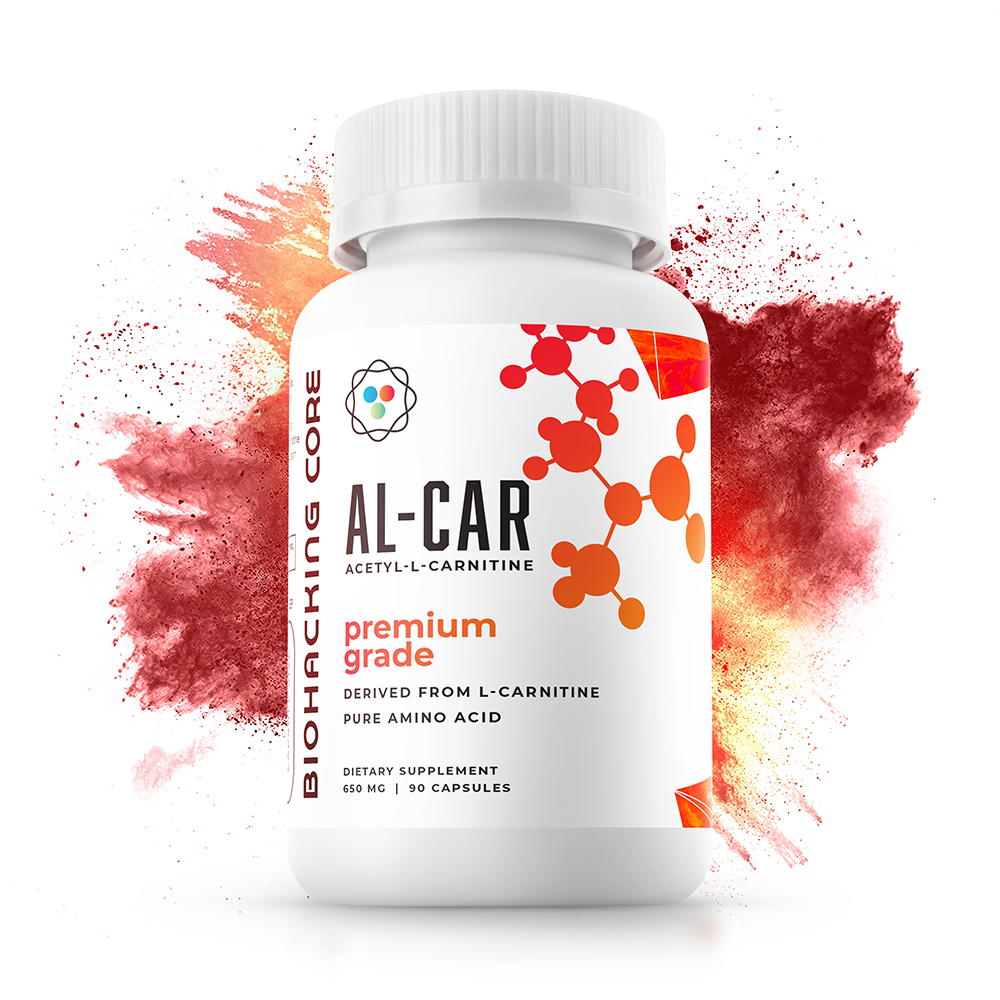

Acetyl-L-Carnitine
- Category: Amino Acids
Quantity
| Quantity | Discounted price | DISCOUNT |
|---|---|---|
| 3-5 | €18.81 | 5%$0.99 |
| 6-9 | €18.22 | 8%$1.58 |
| 10+ | €17.82 | 10%$1.98 |
Shipment will be on monday
DELIVER TO US
Delivery time not available contact us for more information
- Your Biohacking Experts.
- Mo-Fr Same day shipping for orders before 17:00.
- Free shipping for orders above 75eu.
- Superior Quality high purity extracts and compunds.
- Quantity based discounts applicable.
Biohacking Core’s Acetyl L Carnitine 650mg – Unleashing Your Cognitive and Physical Potential
Journey towards optimized potential with Biohacking Core’s Acetyl L Carnitine 650mg. This meticulously formulated supplement is designed to augment both your mental acuity and physical vitality.
Acetyl L Carnitine (ALCAR) is an amino acid naturally produced in the human body. Crucial to energy production, it carries long-chain fatty acids to the mitochondria, the “powerhouses” of our cells, where they are metabolized to generate energy. Additionally, ALCAR is present in animal proteins, including red meat.
This naturally occurring nutrient offers several potential benefits:
- Neuroprotective Potential: ALCAR is known for its potential neuroprotective properties, providing robust defense against age-related cellular damage, and helping to support and maintain healthy brain function1.
- Fighting Fatigue: Acetyl L Carnitine may assist in combating fatigue, promoting mental and physical stamina to help you power through your day2.
- Energy Metabolism: ALCAR plays a key role in fat metabolism, facilitating energy production, and potentially contributing to improved athletic performance.
Why Choose Biohacking Core’s Acetyl L Carnitine 650mg?
In addition to the aforementioned potential benefits, Biohacking Core is dedicated to ensuring quality. Every Acetyl L Carnitine supplement is meticulously crafted under stringent quality controls and designed to deliver the optimal potential benefits of ALCAR supplementation. This commitment to excellence ensures you receive a top-quality product.
Suggested Dosage:
For adults only. We recommend a daily dosage of two capsules (1300mg), preferably taken with a meal. Always consult with a healthcare professional before starting any supplement regimen.
Experience the Potential of Acetyl L Carnitine:
Research suggests that Acetyl L Carnitine supplementation may enhance cognitive function, help manage mental fatigue, and support energy metabolism12. However, individual results may vary, and these potential benefits are best realized as part of a balanced lifestyle that includes a healthy diet and regular exercise.
Begin your journey towards enhanced well-being with Biohacking Core’s Acetyl L Carnitine 650mg, your reliable partner in mental alertness and physical endurance. Incorporate Biohacking Core’s Acetyl L Carnitine into your wellness routine today and tackle life’s challenges with renewed vigor and clarity.
Disclaimer: These statements have not been evaluated by the European Food Safety Authority (EFSA). This product is not intended to diagnose, treat, cure, or prevent any disease.
Acetyl-L-carnitine (ALCAR)
Acetyl-L-carnitine (ALCAR) is an amino acid naturally synthesized in the human body. It plays an essential role in energy production, aiding in the transport of long-chain fatty acids to the mitochondria. These fatty acids are then oxidized to produce energy. Moreover, dietary sources, especially red meat, can also provide ALCAR.1
Acetyl-L-carnitine offers several health benefits for both the brain and body:
- Acts as a powerful neuroprotectant,
- Provides relief from fatigue,
- Guards against age-induced cellular damage,
- Supports and fosters healthy brain function2.
What is Acetyl L-Carnitine (ALCAR)?
ALCAR is an amino acid that our body naturally produces for energy generation. It represents a more bioavailable form of L-carnitine, a lysine derivative. While the body synthesizes L-carnitine, it can also be sourced from dietary animal proteins. Notably, ALCAR can cross the blood-brain barrier efficiently, making it function primarily within the brain. This distinguishes it from other L-carnitine forms that primarily boost physical performance and improve blood flow. ALCAR’s role as a precursor to acetylcholine, known as the “learning neurotransmitter,” classifies it as a potent nootropic.
Research indicates that ALCAR modifies deep energy metabolism by elevating noradrenaline and serotonin levels while reducing gamma-aminobutyric acid (GABA) concentrations. It also supports cellular mitochondria, responsible for converting nutrients into energy, keeping them functional2. Dysfunctional mitochondria have been implicated in age-related disorders like Alzheimer’s and other neurodegenerative diseases.
Mechanism of Action
The primary efficacy of ALCAR as a nootropic is closely linked to the acetylcholine (ACh) pathway. Acetylcholine is a neurotransmitter responsible for a variety of essential functions in the brain. Some of its primary roles include:
- Facilitating learning and memory by regulating its release in the hippocampus;
- Mediating responsiveness to auditory and visual stimuli through cortical ACh levels;
- Enhancing antioxidant activity in the brain, specifically by amplifying the activity of superoxide dismutase.
Benefits of ALCAR Supplements
While ALCAR supplements may enhance cognitive health, function, and even support fat loss and muscle growth, it’s crucial to understand they are not a cure-all. They don’t directly treat, cure, or prevent diseases. Instead, they play a role in supporting and optimizing the body’s natural processes. L-carnitine is particularly beneficial to cardiovascular health. Since the brain heavily depends on the circulatory system for nutrients, oxygen, and essential nootropics, a well-functioning cardiovascular system is imperative for optimal brain function. Moreover, L-Carnitine exhibits antioxidant properties, safeguarding the body from oxidative stress. A study in The American Journal of Clinical Nutrition reported that a cross-over experiment using a placebo significantly reduced L-Carnitine levels while enhancing neurotransmitter function in older adults6. Other research has shown that ALCAR supplementation can bolster memory and learning capabilities3.
Mitochondrial Health
Carnitine enhances both the number and functionality of mitochondria. It also facilitates the effective transportation of fuel to our cells, promoting growth. A study from the University of Naples highlighted that ALCAR supplementation can “…partially counteract leptin resistance… and augment ATP generation in skeletal muscle mitochondria by increasing mitochondrial protein content.”4 In simpler terms, it aids in directing fats to the cells that utilize them for energy.
Research from the University of Nebraska in 2011 indicated potential mitochondrial damage due to alcohol exposure. The study found that Carnitine effectively mitigated these detrimental effects. Specifically, the study posited that oxidants and antioxidants serve as counteracting agents at the blood-brain barrier during instances of alcohol-induced oxidative stress5.
A six-month double-blind, placebo-controlled clinical trial involving 66 participants found ALCAR to be a promising treatment for enhancing vitality across three different age groups. The participants were administered 2 grams of L-Carnitine. The rationale behind the study was the observation that centenarians often face challenges such as physical weakness, deteriorating mental health, limited mobility, and reduced stamina. L-carnitine plays a critical role in cellular energy metabolism. The results showed that oral intake of L-carnitine significantly improved physical and cognitive functions, reducing fatigue and enhancing cognition6.
In 2011, a study conducted by the Italian Institute of Biomembranes and Bioenergetics detected significant age-related variations in 31 proteins related to certain metabolic activities. Upon consuming ALCAR, there were alterations in the levels of 26 proteins. Notably, ALCAR modulated the morphology of mitochondrial cristae by counteracting age-associated changes in eleven mitochondrial proteins7.
Research from Italy demonstrated that an 8-month ALCAR therapy effectively protected rats from age-related declines in spatial learning capabilities. Additionally, ALCAR was found to mitigate lipid peroxidation, a significant contributor to memory impairment with advancing age.
Anti-Fatigue
Numerous studies underscore the anti-fatigue properties of ALCAR. At least seven high-quality clinical trials, involving over 420 participants, have indicated that ALCAR, when taken in doses ranging from 1-2 grams per day, substantially alleviates fatigue, particularly in older individuals. However, evidence concerning its efficacy in younger populations remains scant.
In a 24-week study from the Netherlands, 90 participants suffering from chronic fatigue were administered 2 grams of ALCAR daily. The findings suggested that both acetylcarnitine and propionyl carnitine played a role in reducing fatigue and improving focus. Specifically, acetyl carnitine was more effective in mitigating mental fatigue, whereas propionyl carnitine showed a pronounced effect on overall fatigue8.
Another Italian study involving 96 participants posited the lack of adequate therapeutic interventions for patients suffering from chronic fatigue. Their research outcomes suggest that administering ALCAR to elderly individuals may not only reduce their physical and mental vulnerabilities but also bolster their cognitive and physical performance9.
Mood Enhancer
ALCAR is often promoted as a potent mood enhancer, especially when taken in tandem with other nootropics that enhance mitochondrial energy production. Research from 2013 suggests that the synergy of ALCAR and CoQ10 positively impacts factors such as mitochondrial dysfunction, oxidative stress, altered brain energy metabolism, and the regulation of several mitochondrial genes in individuals with bipolar disorder. This study further underscores the idea that mitochondrial dysfunction plays a pivotal role in the onset of bipolar disease10.
Recommended Dosage
The majority of research on ALCAR has used a dose range of 1-3 grams per day as an initial guideline. Starting with a daily dose of one gram is generally recommended, and adjustments can be made thereafter based on individual needs and responses. It’s worth noting that timing can be crucial when taking supplements. ALCAR’s administration can vary depending on one’s specific goals and requirements11:
- For cognitive and anti-aging benefits: 1-2 grams of acetyl-L-carnitine daily, split between morning and afternoon doses.
- To aid in fat metabolism and support muscle development: 1-3 grams daily, divided into doses taken 90 minutes before and after workouts — this can potentially improve workout endurance and hasten recovery.
Many users report that consuming ALCAR early in the day optimizes cognitive performance during waking hours. Some also find that splitting the dose into multiple intakes during the day yields the best results. However, ingesting ALCAR late in the evening might disrupt sleep patterns. Though ALCAR can be taken on an empty stomach, consuming it with food might help alleviate or prevent gastrointestinal discomfort11.
1. Traina, Giovanna. 2016. “The Neurobiology of Acetyl-L-Carnitine.” Frontiers in Bioscience (Landmark Edition) 21 (June): 1314–29. https://doi.org/10.2741/4459.
2. Gadaleta, Maria Nicola, Vittoria Petruzzella, Marcella Renis, Flavio Fracasso, and Palmiro Cantatore. 1990. “Reduced Transcription of Mitochondrial DNA in the Senescent Rat. Tissue Dependence and Effect of L-Carnitine.” European Journal of Biochemistry 187 (3): 501–6. https://doi.org/10.1111/j.1432-1033.1990.tb15331.x.
3. Bossoni, G., and C. Carpi. “Effect of Acetyl-L-Carnitine on Conditioned Reflex Learning Rate and Retention in Laboratory Animals.” Drugs Under Experimental and Clinical Research 12, no. 11 (1986): 911–16.
4. Iossa, Susanna, Maria Pina Mollica, LionettiLillà, Raffaella Crescenzo, Monica Botta, Antonio Barletta, and Giovanna Liverini. 2002. “Acetyl-L-Carnitine Supplementation Differently Influences Nutrient Partitioning, Serum Leptin Concentration and Skeletal Muscle Mitochondrial Respiration in Young and Old Rats.” The Journal of Nutrition 132 (4): 636–42. https://doi.org/10.1093/jn/132.4.636.
5. Haorah, James, Nicholas A. Floreani, Bryan Knipe, and Yuri Persidsky. 2011. “Stabilization of Superoxide Dismutase by Acetyl-l-Carnitine in Human Brain Endothelium during Alcohol Exposure: Novel Protective Approach.” Free Radical Biology & Medicine 51 (8): 1601–9. https://doi.org/10.1016/j.freeradbiomed.2011.06.020.
6. Malaguarnera, Mariano, Lisa Cammalleri, Maria Pia Gargante, Marco Vacante, Valentina Colonna, and Massimo Motta. 2007. “L-Carnitine Treatment Reduces Severity of Physical and Mental Fatigue and Increases Cognitive Functions in Centenarians: A Randomized and Controlled Clinical Trial.” The American Journal of Clinical Nutrition 86 (6): 1738–44. https://doi.org/10.1093/ajcn/86.5.1738.
7. Musicco, Clara, Valentina Capelli, Vito Pesce, Anna Maria Timperio, Menotti Calvani, Luigi Mosconi, Palmiro Cantatore, and Maria Nicola Gadaleta. 2011. “Rat Liver Mitochondrial Proteome: Changes Associated with Aging and Acetyl-L-Carnitine Treatment.” Journal of Proteomics 74 (11): 2536–47. https://doi.org/10.1016/j.jprot.2011.05.041.
8. Hans, R. 2003, August 5. “March–April 2004 – Volume 66 – Issue 2: Psychosomatic Medicine.” https://journals.lww.com/psychosomaticmedicine/Abstract/2004/03000/Exploratory_Open_Label.
9. Malaguarnera, Michele, Maria Pia Gargante, Erika Cristaldi, Valentina Colonna, Masa Messano, Aleardo Koverech, Sergio Neri, Marco Vacante, Lisa Cammalleri, and Massimo Motta. 2008. “Acetyl L-Carnitine (ALC) Treatment in Elderly Patients with Fatigue.” Archives of Gerontology and Geriatrics 46 (2): 181–90. https://doi.org/10.1016/j.archger.2007.03.012.
10. Nierenberg, Andrew A., Christine Kansky, Brian P. Brennan, Richard C. Shelton, Roy Perlis, and Dan V. Iosifescu. 2013. “Mitochondrial Modulators for Bipolar Disorder: A Pathophysiologically Informed Paradigm for New Drug Development.” The Australian and New Zealand Journal of Psychiatry 47 (1): 26–42. https://doi.org/10.1177/0004867412449303.
11. EFSA. 2011. “Scientific Opinion on the Substantiation of Health Claims Related to Acetyl-L-Carnitine and Contribution to Normal Cognitive Function (ID 1432) Pursuant to Article 13(1) of Regulation (EC) No 1924/2006.” EFSA Journal 9 (6): 2200. Accessed September 11, 2022. https://doi.org/10.2903/j.efsa.2011.2200.
Latest Blogs
But I must explain to you how all this mistaken idea of denouncing pleasure

Research on Sabroxy®
Sabroxy® is a relatively new product on the market that's been making some headlines recently. Unlike many popular nootropics, Sabroxy®...
Read More
What Is Biohacking?
While the term “biohacking” has gained momentum in recent years, its meaning can differ depending on the context in which...
Read More
Research on PrimaVie® Shijalit
The market is full of countless substances touted for their positive impact on brain health, cognition, mood, energy levels, and...
Read More
Level Up: Unearth Our Unsurpassed Quality!
CONTACT

0 reviews
Only logged in customers who have purchased this product may leave a review.